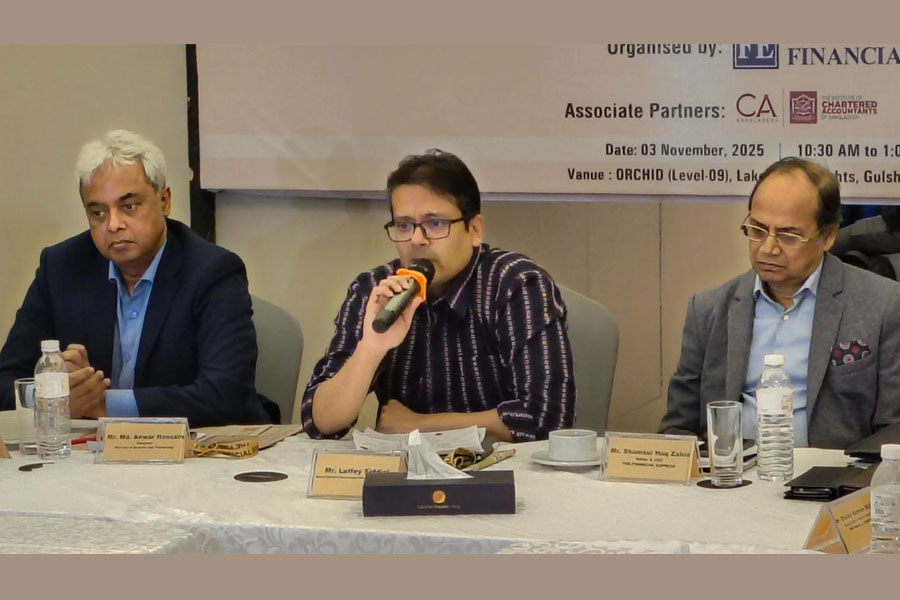
Published :
Updated :

Bangladesh needs reform from the design level, said Lutfey Siddiqi, Special Envoy on International Affairs to the Chief Adviser, emphasising that fundamental flaws in administrative design continue to hold back progress despite recent achievements.
Speaking at a roundtable discussion on “Business Climate: Reforms, Opportunities, and Challenges Ahead” organised by The Financial Express at a hotel in Gulshan, Mr. Siddiqi called for a complete redesign of the administrative and governance structure, noting that piecemeal reforms would not be enough to ensure long-term efficiency and growth.
He advised the businesses not to be late in the next elected government area to take advantage of reforms which was missed after the student-led uprising in Bangladesh.
“We had done work on consensus commission aiming to bring reforms; however, economic reforms didn’t take place.”
"We need a reform from the design level", he said, adding that there is no one who is responsible for the whole logistics sector or export sector.
Referring to Singapore and Malaysia, he said they have inter-ministerial coordinators under the prime minister’s office for specific issues to streamline these processes.
"We need similar structural redesigns."
“We have a fundamental design flaw,” he said. “Our bureaucracy has no clear accountability for logistics or exports."
Mr. Siddiqi highlighted the progress made under recent initiatives such as the National Single Window, which has already delivered over 500,000 services and helped avoid approximately 1.2 million office visits, according to a World Bank report.
The introduction of e-gates at ports has also drastically reduced clearance time—from 20 minutes to just 20 seconds.
He said the main barrier to introducing automation (digitalisation) is the mindset of people and government officials.
Mr. Siddiqi said there is an option in the law for pre-arrival customs clearance; however, it is not working, he said, adding that, "We are trying to make it operational to improve trade facilitation.
Reflecting on the early challenges he faced upon joining the government, Mr. Siddiqi said: “Half of the government staff were inactive, and there were no police officers for security. Industrial zones were unstable due to widespread worker unrest. Yet, through sustained efforts, we’ve managed to restore stability.”
He acknowledged the government’s success in containing inflation despite global instability, crediting the Finance Adviser and Bangladesh Bank Governor for their effective measures.
“After any major economic shock, inflationary pressure is inevitable. But we were able to stabilise the situation,” he added.
Mr. Siddiqi also mentioned that bureaucratic procedures have been streamlined.
“Previously, every issue required approval from five different offices. Now, we can resolve in a single sitting at a coordination meeting,” he said.
He further noted improvements in the country’s ease of doing business score:
“When we started working, the ease of doing business reforms had practically failed. Now, progress has improved from that level, but yet to be further improved. Within a year, the narrative has changed significantly—at the recent World Bank event, our finance adviser was warmly welcomed, which was unimaginable a year ago.”
The envoy stressed the role of the private sector in driving reform.
“The private sector must put pressure to accelerate economic reforms,” he said. “SMEs still lack a strong voice, but we’ve started taking steps—like introducing SME cards that allow up to $3,000 in digital payments for platforms such as Facebook.”
He cited a recent administrative success where 600,000 overdue passports were cleared within a month, demonstrating that effective coordination can yield tangible results.
During the discussion, Anwar Hossain, Secretary of the Ministry of Science and Technology and Mohammad Hasan Arif, Vice Chairman of EPB, were present as special guests, while Taskeen Ahmed, President of the Dhaka Chamber of Commerce and Industry (DCCI), called for a stable political mandate to encourage private investment.
“Energy security remains a concern,” Mr. Ahmed said. “Although the sector has developed, certain policy gaps continue to undermine long-term stability.”
The roundtable also discussed the need for coordinated policymaking through a consensus commission and emphasised that the economic sector must receive focused attention in future reform agendas.
The distinguished panel of discussants included Mr Abul Kasem Khan, Chairperson of Business Initiative Leading Development (BUILD); Mr Inamul Haq Khan, Senior Vice-President of the Bangladesh Garment Manufacturers and Exporters Association (BGMEA); Mr Mohammad Hatem, President of the Bangladesh Knitwear Manufacturers and Exporters Association (BKMEA); Mr Showkat Aziz Russell, President of the Bangladesh Textile Mills Association (BTMA). Also on the panel were Mr Sharif Zahir, Chairman of United Commercial Bank (UCB), and Mr Md Ahsan-uz Zaman, Managing Director and CEO of Midland Bank PLC.
Other discussants included Ms Doulot Akter Mala, President of the Economic Reporters’ Forum (ERF); Mr KSM Mostafizur Rahman, President of the Bangladesh Agro Processors’ Association (BAMA); Mr Shams Mahmud, President of the Bangladesh-Thai Chamber of Commerce and Industry (BTCCI); Mr Moynul Islam, President of the Bangladesh Ceramic Manufacturers and Exporters Association (BCMEA); Mr Khourshed Alam, Chief Operating Officer (Building Materials) of AkijBashir Group; Ms Kakoli Jahan Ahmed, Executive Director of Bangladesh Bank; and Mr Shubhashish Bose, Chief Executive Officer of the Institute of Chartered Accountants of Bangladesh (ICAB).


 For all latest news, follow The Financial Express Google News channel.
For all latest news, follow The Financial Express Google News channel.